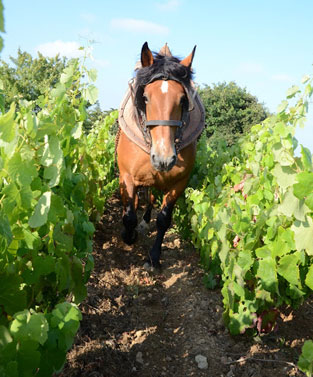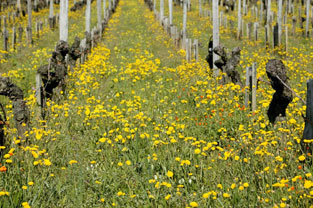PREPARATIONS
These are made from processed plant, animal and mineral matter:
- MT manure compost supports and strengthens the soil's decomposition process. It contains all the elements that help form the clay-humus complex. These include a considerable variety and number of bacteria.
- Preparation 500, cow horn manure, acts on the plant. It strengthens life beneath the ground. Its effectiveness has been confirmed after numerous trials: roots are longer, denser and better distributed.
- Preparation 501, horn silica, helps with leaf development, balanced flowering and the energy necessary for healthy, bountiful fruiting.
These first three must undergo dynamisation before spreading.
The other preparations, developed from yarrow, camomile, nettles, oak bark, dandelion and valerian, all involve some sort of transformation process - such as fermentation with animal organs - which boost their primary properties by transforming them into humus with specific qualities.
These are indispensable, being used in the production of composts to direct the fermentation, creating balance and harmony in the soil and the plant.

THE TERRESTRIAL AND LUNAR CYCLES
The solar cycles, made up of the day and night, and the seasons, and the lunar cycles are familiar to us. Experiments carried out by Maria Thun more than ten years ago have enabled the observation of cosmic influences on plant growth.
These seem to be linked to the positions of the moon, sun and planets in relation to other constellations.
A calendar, based on her observations, has been established. Work and treatments in the vineyard can be enhanced by the choice of the date on which they are carried out.

HOEING
Hoeing stimulates vital processes by working the soil at different times of the year, month or even day.
Hoeing according to the phases of the moon will have a different effect in the spring or autumn. Hoeing in the morning stimulates plants, while hoeing in the afternoon helps to keep water in the soil...
It is the winegrower who has to decide the appropriate hoeing and ploughing operations, according to the soil.

BIODYNAMIC FARMING: AN APPROACH THAT GOES FURTHER
Among the various "natural" and organic approaches, biodynamic farming stands out for its consideration of astrological influences and the cycles of nature, and its use of herbal preparations of a homoeopathic nature, aimed at rebalancing and revitalizing plant growth, rather than treating diseases.






